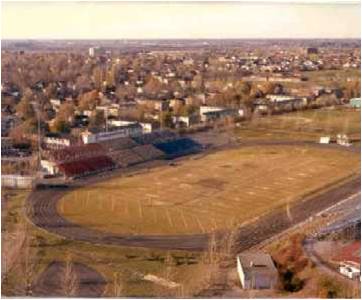Richardson Stadium is named in honour of Captain George Taylor Richardson, student and athlete at Queen’s University and member of the 2nd Battalion, who was killed in action on February 9, 1916.
The original Richardson Stadium, known as George Taylor Richardson Memorial Stadium, was opened in 1921 on the site now occupied by Mackintosh-Corry Hall and Tindall Field, at the corner of Union Street West and University Avenue, on the Queen’s University main campus. The stadium included a football field and running track, as well as a grandstand accommodating 1,900 people and bleachers for an additional 1,500 fans. The stadium was dedicated in the presence of Mr. James Richardson, Queen's alumni and brother of Captain Richardson.
Shortly after its inauguration, the stadium played host to the 1922 Grey Cup which saw Queen’s defeat the Edmonton Elks 13-1. In the late 60’s- early 70’s, Queen’s University acquired the West Campus lands (between Johnson and Union streets, and Sir John A. MacDonald Blvd) and built a new, larger stadium which opened in 1971. To perpetuate the memory of Captain Richardson’s selfless sacrifice, the university retained the name of the original stadium and named the new facility “Richardson Stadium”. In 2015, the stadium underwent an important renovation, but steadfast work allowed the facility to be ready for the 2016 football season.
George Taylor Richardson was born in 1886 in Kingston and after completing his early education, he entered Queen’s University, graduating in 1909. By then he had already joined the 14th Princess of Wales Own Regiment (1907) and was well known as an excellent athlete and hockey player. With his BSc in hand, he joined the family business and assumed increasing responsibilities.
On the outbreak of the First World War, he volunteered for service overseas and was assigned to the 2nd Canadian Infantry Battalion. After training at Valcartier and on Salisbury Plain, the battalion landed in France in February 1915, and then entered the trenches around Armentieres. Shortly thereafter it advanced to Ypres where it suffered losses amounting to “virtual annihilation.” Having already experienced the most intense conflict, Richardson, now a Captain, led a courageous but ultimately futile attempt to retake Saint-Julien before emerging as the sole surviving officer of No. 2 Company, of which he then assumed command.
Richardson was known as a man who would never give an order he would not readily obey himself, and often used his own money to buy extra supplies, such as warm boots, for his troops. On the night of February 8-9, 1916, having entered No Man’s Land near Wulverghem, Belgium to supervise the withdrawal of a raiding party, Richardson was shot through the hips and died shortly thereafter. He is buried in Bailleul, France, and was posthumously awarded the “Legion d’honneur Croix de Guerre” by the President of the French Republic in March, 1916.



